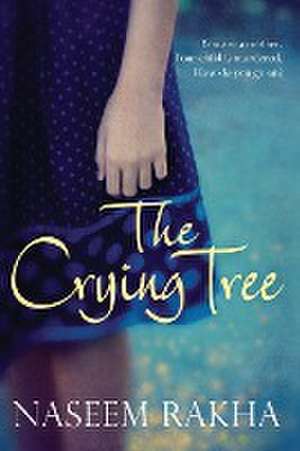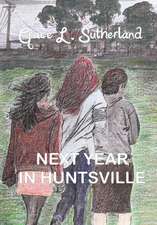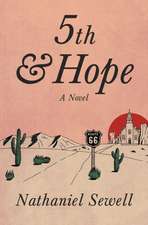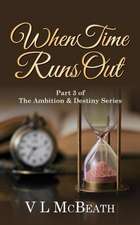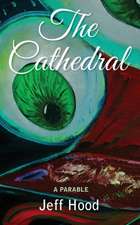The Crying Tree
Autor Naseem Rakhaen Limba Engleză Paperback – 24 mar 2016
| Toate formatele și edițiile | Preț | Express |
|---|---|---|
| Paperback (2) | 95.61 lei 6-8 săpt. | |
| MacMillan – 24 mar 2016 | 95.61 lei 6-8 săpt. | |
| BROADWAY BOOKS – 30 iun 2010 | 108.72 lei 6-8 săpt. |
Preț: 95.61 lei
Preț vechi: 110.86 lei
-14% Nou
Puncte Express: 143
Preț estimativ în valută:
18.30€ • 18.86$ • 15.45£
18.30€ • 18.86$ • 15.45£
Carte tipărită la comandă
Livrare economică 03-17 martie
Preluare comenzi: 021 569.72.76
Specificații
ISBN-13: 9781509821235
ISBN-10: 1509821236
Pagini: 370
Dimensiuni: 156 x 234 x 22 mm
Greutate: 0.63 kg
Editura: MacMillan
ISBN-10: 1509821236
Pagini: 370
Dimensiuni: 156 x 234 x 22 mm
Greutate: 0.63 kg
Editura: MacMillan
Notă biografică
NASEEM RAKHA is an award-winning broadcast journalist whose stories have been heard on NPR. She lives in Oregon’s Willamette Valley.
Extras
The Crying Tree
Naseem Rakha
C H A P T E R 1
October 1, 2004
THE DEATH WARRANT ARRIVED THAT morning, packaged in a large white envelope marked confidential and addressed to Tab Mason, Superintendent, Oregon State Penitentiary. Mason had been warned the order might be coming. A couple of weeks earlier, the Crook County DA had let the word slip that after nineteen years on death row, condemned murderer Daniel Joseph Robbin had stopped his appeals.
Mason dropped the envelope on his desk, along with a file about as thick as his fist, then ran his hand over the top of his cleanly shaved skull. He’d been in corrections for twenty years–Illinois, Louisiana, Florida–and on execution detail a half- dozen occasions, but he’d never been in charge of the actual procedure. Those other times he’d simply walked the guy into the room, strapped him down, opened the blinds on the witness booth, then stood back and waited. He’d worked with one guy in Florida who’d done the job fifty times. “It becomes routine,” the officer told Mason, who was busy puking into a trash can after witnessing his fi rst execution.
Now Mason slid into his chair, flicked on his desk lamp, and opened Robbin’s file. There was the man’s picture. A front and side shot. He had been nineteen years old when he was booked, had long scraggly hair and eyes squinted to a hostile slit. Mason turned the page and began to read. On the afternoon of May 6, 1985, Daniel Joseph
Robbin beat, then shot fifteen-year-old Steven Joseph Stanley (aka “Shep”) while in the process of robbing the boy’s home at 111 Indian Ridge Lane. The victim was found still alive by his father, Deputy Sheriff Nathaniel Patrick Stanley, but died before medical
assistance could arrive. The remaining family members–wife and mother, Irene Lucinda Stanley, and twelve-year-old Barbara Lee (aka Bliss)–were not present during the incident. The Stanleys, who were originally from Illinois, had been living in Oregon for a year and a half when the incident occurred.
The superintendent leafed through more pages–court documents, letters, photos–then leaned back in his chair and looked out his window. A squat rectangular building sat on its own toward the north end of the prison’s twenty-five-acre grounds. The last time someone had been executed out there was seven- plus years ago. Mason had been working his way up through the ranks at the Florida State Prison out of Raiford, aspiring for a job like the one he had now–head of a large correctional institution, good salary, power. He blew out a long, disgusted breath. Why now? The Oregon penitentiary was way overcrowded, inmates doubled up in their cells, half of them out of their minds; fights were breaking out left and right, gangs getting tougher to handle; there were race issues, drugs–all while funding for counseling and rehab continued to get slashed. Why now, and why this?
Mason reread the warrant. The execution was scheduled for October 29, 12:01 A.M.
“Less than a goddamn month,” he said, shaking his head. Then, as if to rouse himself, he clapped his mismatched hands, one as dark as the rest of his black skin, one strangely, almost grotesquely white. There was no complaining in this job, he told himself. No moaning about what needed to be done. No stammering or stuttering or
doing anything that might show the slightest bit of resistance or hesitancy. No. Everything in his career had been leading him to this kind of challenge: his demeanor, his words, his actions would all set a tone. And he knew exactly what that tone had to be.
From the Hardcover edition.
Naseem Rakha
C H A P T E R 1
October 1, 2004
THE DEATH WARRANT ARRIVED THAT morning, packaged in a large white envelope marked confidential and addressed to Tab Mason, Superintendent, Oregon State Penitentiary. Mason had been warned the order might be coming. A couple of weeks earlier, the Crook County DA had let the word slip that after nineteen years on death row, condemned murderer Daniel Joseph Robbin had stopped his appeals.
Mason dropped the envelope on his desk, along with a file about as thick as his fist, then ran his hand over the top of his cleanly shaved skull. He’d been in corrections for twenty years–Illinois, Louisiana, Florida–and on execution detail a half- dozen occasions, but he’d never been in charge of the actual procedure. Those other times he’d simply walked the guy into the room, strapped him down, opened the blinds on the witness booth, then stood back and waited. He’d worked with one guy in Florida who’d done the job fifty times. “It becomes routine,” the officer told Mason, who was busy puking into a trash can after witnessing his fi rst execution.
Now Mason slid into his chair, flicked on his desk lamp, and opened Robbin’s file. There was the man’s picture. A front and side shot. He had been nineteen years old when he was booked, had long scraggly hair and eyes squinted to a hostile slit. Mason turned the page and began to read. On the afternoon of May 6, 1985, Daniel Joseph
Robbin beat, then shot fifteen-year-old Steven Joseph Stanley (aka “Shep”) while in the process of robbing the boy’s home at 111 Indian Ridge Lane. The victim was found still alive by his father, Deputy Sheriff Nathaniel Patrick Stanley, but died before medical
assistance could arrive. The remaining family members–wife and mother, Irene Lucinda Stanley, and twelve-year-old Barbara Lee (aka Bliss)–were not present during the incident. The Stanleys, who were originally from Illinois, had been living in Oregon for a year and a half when the incident occurred.
The superintendent leafed through more pages–court documents, letters, photos–then leaned back in his chair and looked out his window. A squat rectangular building sat on its own toward the north end of the prison’s twenty-five-acre grounds. The last time someone had been executed out there was seven- plus years ago. Mason had been working his way up through the ranks at the Florida State Prison out of Raiford, aspiring for a job like the one he had now–head of a large correctional institution, good salary, power. He blew out a long, disgusted breath. Why now? The Oregon penitentiary was way overcrowded, inmates doubled up in their cells, half of them out of their minds; fights were breaking out left and right, gangs getting tougher to handle; there were race issues, drugs–all while funding for counseling and rehab continued to get slashed. Why now, and why this?
Mason reread the warrant. The execution was scheduled for October 29, 12:01 A.M.
“Less than a goddamn month,” he said, shaking his head. Then, as if to rouse himself, he clapped his mismatched hands, one as dark as the rest of his black skin, one strangely, almost grotesquely white. There was no complaining in this job, he told himself. No moaning about what needed to be done. No stammering or stuttering or
doing anything that might show the slightest bit of resistance or hesitancy. No. Everything in his career had been leading him to this kind of challenge: his demeanor, his words, his actions would all set a tone. And he knew exactly what that tone had to be.
From the Hardcover edition.
Recenzii
"Beautifully written, expertly crafted, forcefully rendered. Naseem Rakha lays bare all the ambiguities and nuances of our culture in a story that is compelling and deep. The Crying Tree is a story of forgiveness and redemption, but at its core it is a love story as well, and that is the most powerful story of all."
--Garth Stein, author of The Art of Racing in the Rain
In The Crying Tree Naseem Rakha uses grace and honesty to tell the gripping story of parents losing a son to murder and their desperate hope that an execution will provide closure, while allowing readers to consider the idea of forgiveness as a means of healing.
--Randy Susan Meyers, author The Murderer's Daughters
Naseem Rakha writes with both clarity and sympathy about one of the most mysterious and evasive of human impulses: forgiveness. The Crying Tree is a memorable and deeply humane novel.
--Jon Clinch, author Finn and Kings of Earth
This complex, layered story of a family's journey toward justice and forgiveness comes together through spellbinding storytelling. Deputy sheriff Nate Stanley calls home one day and announces he's accepted a deputy post in Oregon. His wife, Irene, resents having to uproot herself and their children, Shep and Bliss, from their small Illinois town, but Nate insists it's for the best. Once they've moved into their new home, Shep sets off to explore Oregon's outdoors, and things seem to be settling in nicely until one afternoon when Nate returns home to find his 15-year-old son beaten and shot in their kitchen. After Shep dies in Nate's arms, the family seeks vengeance against the young man, Daniel Joseph Robbin, accused of Shep's murder. In the 19 years between Shep's death and Daniel's legal execution, Bliss becomes all but a caretaker for her damaged parents, and a crisis pushes Irene toward the truth about what happened to Shep. Most of the big secret is fairly apparent early on, so it's a testament to Rakha's ability to create wonderfully realized characters that the narrative retains its tension to the end.--Publishers Weekly
A more common name for the "crying tree" is the willow, and one grows near Steven (Shep) Stanley's grave in Blaine, OR. This 15-year-old was killed in his home, and his best friend, Daniel, has been found guilty of the crime and waits a lethal injection on death row. Gifted musician Shep was definitely the center of the world for his mother, Irene, and the intensity of her grief is exquisitely portrayed in this moving, unsentimental tale of loss. After years of severe depression, withdrawal from her family, and alcoholism, Irene comes to realize that if she does not forgive her son's killer she will be destroyed. She secretly writes to Daniel in prison, and they begin corresponding. Then Irene receives written notice of the execution date and knows she must act. VERDICT Gifted storyteller Rakha has crafted a beautiful and passionate novel that never becomes maudlin or unbelievable. All of the characters are genuinely human, and the author even manages to save a few surprising plot details to the end. Highly recommended, especially for readers interested in the subject of loss and coping.- Library Journal
"Rakha writes of one of her central subjects, 'and it wasn't anything she knew how to handle.' Not so for the author, who has crafted not only a compelling read, but one whose message lingers: At what point does that to which we cling for our survival become the very thing that robs us of our life?"ߝThe Oregonian
"The Crying Tree is a powerful novel full of moral questions as well as surprises. Like real life, there are no easy roads for these characters, but they make their way, one step at a time."ߝLas Vegas Review-Journal
"The Crying Tree is hauntingly beautiful and sad as Rakha examines themes of hate, forgiveness, redemption, acceptance and love. Here, Rakha brings hard questions for which there are no black-and-white answers to the fore. Readers are forced to question their own beliefs as Rakha's characters delve into their own."ߝDeseret News
"Absorbing and deeply melancholy….Delving into the controversial subjects of capital punishment, forbidden relationships and forgiveness for horrific
acts, [Rakha's] debut novel seems designed to inspire heated debate in book clubs."
ߝBookPage
"This is a gripping, well-paced tale, compassionate without being mawkish." -The Guardian
--Garth Stein, author of The Art of Racing in the Rain
In The Crying Tree Naseem Rakha uses grace and honesty to tell the gripping story of parents losing a son to murder and their desperate hope that an execution will provide closure, while allowing readers to consider the idea of forgiveness as a means of healing.
--Randy Susan Meyers, author The Murderer's Daughters
Naseem Rakha writes with both clarity and sympathy about one of the most mysterious and evasive of human impulses: forgiveness. The Crying Tree is a memorable and deeply humane novel.
--Jon Clinch, author Finn and Kings of Earth
This complex, layered story of a family's journey toward justice and forgiveness comes together through spellbinding storytelling. Deputy sheriff Nate Stanley calls home one day and announces he's accepted a deputy post in Oregon. His wife, Irene, resents having to uproot herself and their children, Shep and Bliss, from their small Illinois town, but Nate insists it's for the best. Once they've moved into their new home, Shep sets off to explore Oregon's outdoors, and things seem to be settling in nicely until one afternoon when Nate returns home to find his 15-year-old son beaten and shot in their kitchen. After Shep dies in Nate's arms, the family seeks vengeance against the young man, Daniel Joseph Robbin, accused of Shep's murder. In the 19 years between Shep's death and Daniel's legal execution, Bliss becomes all but a caretaker for her damaged parents, and a crisis pushes Irene toward the truth about what happened to Shep. Most of the big secret is fairly apparent early on, so it's a testament to Rakha's ability to create wonderfully realized characters that the narrative retains its tension to the end.--Publishers Weekly
A more common name for the "crying tree" is the willow, and one grows near Steven (Shep) Stanley's grave in Blaine, OR. This 15-year-old was killed in his home, and his best friend, Daniel, has been found guilty of the crime and waits a lethal injection on death row. Gifted musician Shep was definitely the center of the world for his mother, Irene, and the intensity of her grief is exquisitely portrayed in this moving, unsentimental tale of loss. After years of severe depression, withdrawal from her family, and alcoholism, Irene comes to realize that if she does not forgive her son's killer she will be destroyed. She secretly writes to Daniel in prison, and they begin corresponding. Then Irene receives written notice of the execution date and knows she must act. VERDICT Gifted storyteller Rakha has crafted a beautiful and passionate novel that never becomes maudlin or unbelievable. All of the characters are genuinely human, and the author even manages to save a few surprising plot details to the end. Highly recommended, especially for readers interested in the subject of loss and coping.- Library Journal
"Rakha writes of one of her central subjects, 'and it wasn't anything she knew how to handle.' Not so for the author, who has crafted not only a compelling read, but one whose message lingers: At what point does that to which we cling for our survival become the very thing that robs us of our life?"ߝThe Oregonian
"The Crying Tree is a powerful novel full of moral questions as well as surprises. Like real life, there are no easy roads for these characters, but they make their way, one step at a time."ߝLas Vegas Review-Journal
"The Crying Tree is hauntingly beautiful and sad as Rakha examines themes of hate, forgiveness, redemption, acceptance and love. Here, Rakha brings hard questions for which there are no black-and-white answers to the fore. Readers are forced to question their own beliefs as Rakha's characters delve into their own."ߝDeseret News
"Absorbing and deeply melancholy….Delving into the controversial subjects of capital punishment, forbidden relationships and forgiveness for horrific
acts, [Rakha's] debut novel seems designed to inspire heated debate in book clubs."
ߝBookPage
"This is a gripping, well-paced tale, compassionate without being mawkish." -The Guardian
